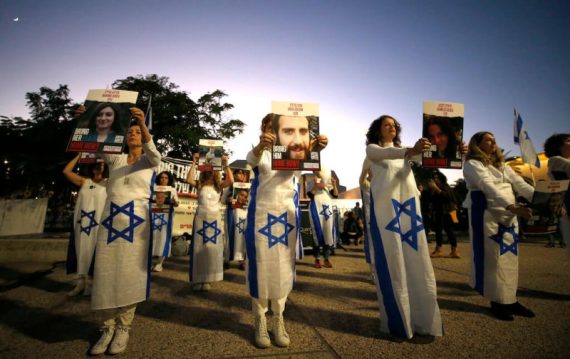A
lthough there has been a collective impulse among Israeli politicians to act and make decisions in order to win the war against Hamas, the Israeli public is not united along the same lines: the nationalist-religious groups support all the army’s actions without exception, while a minority in the left call for an immediate ceasefire.
On October 7, at 6:30 a.m., an intense rocket attack on Israel began from Gaza. Since the day of Israel’s creation, Israelis have become accustomed to being in conflict with the Palestinians, who have been permanently prevented from establishing a sovereign state. Little did they know, however, that October 7 would be different from other attacks.
That morning, as rockets rained into Israel, Hamas and Islamic Jihad militants rode armed on motorcycles and pickup trucks through Erez, one of the border crossing points separating the Gaza Strip and Israel. They raided the Nahal Oz and Re’im military bases near the border, and then raided towns close to the Gaza Strip. The offensive resulted in 1,140 Israelis being killed, 3,300 being wounded, and 239 people, including soldiers, taken hostage into Gaza in what is believed to have started as an organized raid and then evolved into spontaneous clashes.
The picture that emerged as time passed did not only shock Israeli citizens but government officials as well. The shock of these attacks, which were already unexpected for the public, was multiplied by the fact that they coincided with the Sabbath, a day of religious observance for followers of the Jewish faith. As the Israeli army took time to recover from its shock and took action, families hiding in shelters in the raided towns called the security forces for help and the whole world witnessed the events through social media before an intervention took place.
Governmental silence
In these difficult hours, the silence of the government officials until they issued a statement felt like years to Israelis. The statement read: “This morning Hamas made a fatal mistake and started a war against the state of Israel. The soldiers of the Israel Defense Forces are fighting the enemy in all areas where there are infiltrations.” The statement proclaimed that Israel will win this war. Then, Israeli Prime Minister Binyamin Netanyahu appeared in front of the cameras and addressed Israeli citizens. “This is not an operation or a mutual attack, this is a war. Hamas has launched a bloody surprise attack against Israeli citizens since the morning hours. We have been involved in it since the morning hours.” Netanyahu added that he had ordered the army to “fight the enemy with unprecedented force.” In subsequent statements, he reiterated that they would leave no stone unturned in Gaza and will take revenge.
In retaliation for Hamas’s Operation Al-Aqsa Flood, Israel launched Operation Iron Swords, whose declared aim was to destroy and liquidate Hamas’s military capacity, and ravaged the northern Gaza Strip with airstrikes unprecedented in the 21st century. The indiscriminate bombardments and disproportionate use of force have so far killed 19,532 Palestinians.
Of course, the Israeli authorities could not stand by without taking action to protect their citizens, and in the aftermath of the attacks, Israel received support from the international community on the grounds of its right to self-defense. However, Israel’s targeting of civilians and bombing of mosques, churches, schools, and United Nations buildings, which are forbidden under the laws of war, instead of conducting a targeted retaliation or counterterrorist operation like a defending state, was a violation of international law. Consequently, the Israeli army has been condemned for causing a humanitarian catastrophe in Gaza.
Interrogations into Netanyahu
Two days after the Hamas attacks, the left, liberal-leaning newspaper Haaretz, which seemed to have recovered somewhat from the initial shock, started asking the right questions. Its headline on October 9 asked, “Who Is Responsible for the Attacks?”
Haaretz pointed to Prime Minister Netanyahu as the main culprit for the horror. It was he who, through his policies, or lack of policies, towards the Palestinians over the years had brought them to this point.
Since the last elections, when Netanyahu became prime minister of the country, he has been at the center of mass demonstrations in Israel. Netanyahu formed a coalition of ultranationalist religious fascists that could be considered uncompromising, something unprecedented in Israel’s political history. At the time of the attacks from Gaza, demonstrations had been going on in the country for more than four months, fueling political instability and social unrest.
Hundreds of thousands of people gathered in Tel Aviv every weekend to protest against the judicial overhaul, which many Israelis saw as an attempt of certain far-right figures, most notably Netanyahu, to save themselves from the corruption trials they were facing. This was, in fact, a reflection of a much deeper social fracture in Israeli society: the country’s secular majority, on the one side, and, on the other, the ultranationalist religious minority. Despite being a minority, the latter now occupies key positions in power and is feared to be undermining the “free, modern and democratic structure” of the country.
While Israeli society was dealing with this political-social crisis at home, the attacks were seen by some as the realization of claims by certain quarters that the instability caused by Netanyahu’s stubbornness in the face of the demonstrations left the country open to external threats. As the days passed and Netanyahu remained silent in the face of the question posed by Haaretz, the same quarters began to argue that the war in Gaza, which is being waged at his behest and whose legitimacy is diminishing, was not for Israel’s security but for his own political career.
According to Haaretz, Netanyahu’s policy of annexing the West Bank was designed to make a two-state solution impossible. In fact, Netanyahu strengthened Hamas, thus weakening both the Palestinian authority and the prospects for peace. Haaretz asserted that Netanyahu must take responsibility and resign.
The October 7 attacks also triggered the horrors of the Holocaust in the Jewish collective memory, and many Israelis perceived the attacks as the last of the pogroms that Jews have suffered throughout their history. In this respect, the attacks were seen as a ray of hope that could unite a society that was polarized by all the above. Although the reflex to put aside differences, and act and make decisions together in order to win the war against Hamas emerged among politicians, the Israeli public did not share such sentiments: already existing social divisions were reinforced by the attacks on Gaza.
Ultranationalist and religious support for the war
The ultranationalist and religious groups supported and justified all the army’s actions without exception, while the left/liberal secularists called for an immediate ceasefire, labeling the attacks as war crimes. The latter groups were denounced by others as traitors and demonstrations calling for a ceasefire and the return of the hostages were suppressed by the security forces.
Prime Minister Netanyahu, who has been accused of refusing to agree to a ceasefire for the return of hostages since the attacks began, finally reached a deal that allowed the return of Israeli civilian hostages in exchange for Palestinian women and children in Israeli prisons. However, in the evenings, crowds continue to gather outside his Jerusalem residence, calling for his resignation. Netanyahu is no longer seen as a leader who can rally the whole country behind him. In fact, the moment the Gaza operations cease, we are likely to see many more and angrier Israelis on the streets than during the protests against the judicial reforms. Such protesters believe that the real cause of these horrific attacks are the continued occupation, the unwillingness, and the inaction to resolve the conflict with the Palestinians.
This is why the anger against Netanyahu is even more intense than before, fueled by the fact that the hostage families have been ignored, the prime minister has yet to take responsibility, and he went as far as to issue a statement blaming the army and Shin Bet, the Israel Security Agency, for the attacks. The families of the hostages even wrote a letter to President Recep Tayyip Erdoğan asking him to take steps to bring them back. Addressing far-right Minister of National Security Itamar Ben-Gvir, Gil Dickman, a spokesperson for the hostage families’ platform, expressed the sharpness of the disagreement when he said, “Your concern is killing Arabs.” Ben-Gvir had called for the withdrawal of a Knesset bill to introduce the death penalty for “terrorists,” and Dickman responded out of fear that such a step would endanger the lives of the hostages.
Recommended
The other side of Israeli public opinion
At the same time, there is a public opinion made up of far-right ultranationalist and religious groups that applaud the Israeli army’s ground offensive in the Gaza Strip, calling for “Death to the Arabs” and celebrating the return of the Jews to “God’s promised land.” A song about the war in Gaza, produced and circulated by Ofer Rosenbaum, owner of the publicity company Civil Front, was sung by children and included the words, “In a year we will destroy everyone and return to sow our fields.” Shortly after, Rosenbaum placed an installation at Dizengoff Square in Tel Aviv. In memory of the victims of the October 7 attacks, the structure features angel wings covered with photographs of the Israelis killed in the Hamas attacks and a rope gallows between the wings. The installation is called “October Massacre Terrorists to the Gallows.”
Palestinians in Israel were also targeted by these groups. Ben-Gvir, in particular, did his best to make Palestinians feel insecure. One of his campaigns that made headlines on social media was the arming of Israeli civilians to provide local security. Under his command, law enforcement authorities not only disallowed demonstrations in the Israeli-Palestinian towns of Umm al-Fahm and Sakhnin, but detained Palestinian civil society leaders who questioned this decision, arresting some on charges of making statements “supporting the enemy.”
One of the first public figures to appear in the first hours after the Hamas attacks was Ra’am party leader Mansour Abbas. He called on both the Israeli and Palestinian communities in Israel to refrain from violence and to act responsibly, in a way conveying to the appropriate authorities that the Palestinian citizens of Israel should not be held responsible for Hamas’s actions. Ayman Odeh, the leader of the Hadash-Ta’al list, showed similar restraint and responsibility, saying, “The best revenge against the enemies of peace is to work for peace; this is the right choice.” The condemnation of the Hamas attacks and the restraint shown by Palestinian leaders in Israel have prevented the anti-Arab demonstrations that were likely to take place on the streets of Israel. Alternatively, it was possible to see a repeat of the events of May 2021.
Palestinian citizens of Israel are still afraid to send their children to demonstrations in the face of what the far-right, anti-Arab government in Israel might do, fearing that even a peaceful demonstration could result in the police treating them as “terrorists” and shooting them. Yet, since the evening of October 7, civil society organizations that have been trying for years to inculcate the values that make Arab-Jewish coexistence possible have worked together to strategize and show solidarity to prevent such violence from occurring. Thirty such local groups came together after October 7 in Jerusalem to form a chain of solidarity. The steadfastness of the Palestinian people in Gaza and Israelis lack of support for Netanyahu could bring the end of the genocide in Gaza closer.





